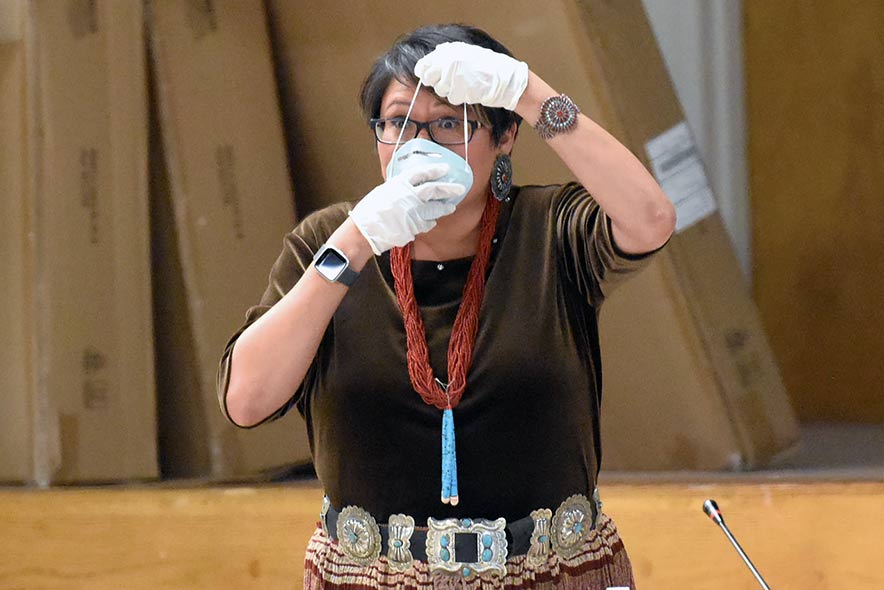
3 cases of coronavirus confirmed: Officials increase efforts to fight spread of illness

Navajo Times | Donovan Quintero
Delegate Eugenia Charles-Newton prepares to put on a mask the special session on Monday in Window Rock. Charles-Newton posted on social last Friday she was “self containing” herself for 14 days. She added that she would attend the special session wearing the “necessary equipment.”
WINDOW ROCK
COVID-19 has made its way to the Navajo Nation.
Three Navajos, ages 46, 40, and 62, all from the small community of Chilchinbeto, have tested positive for COVID-19.
The first two patients, a man and a woman, are currently in a Phoenix hospital where they are in stable condition, according to Del Yazzie, with the Navajo Nation Epidemiology Center, during a phone-in press conference Wednesday morning. News of the third case, a man, came in after the press conference and his condition was not known at press time.
“We will be going out to some of the homes from where the cases are from (to check for) for possible exposure,” said Yazzie. “The work will be ongoing.”
U.S. Indian Health Service Chief Medical Officer Lorretta Christensen said during the press conference that these cases are “rapidly evolving situations,” and they are closely monitoring the patients.
And although the patients’ family members have been tested, tests are limited as they are across the U.S.
“Testing is limited and is challenging all of us across the U.S.,” said Christenson, who said tests could take 2 to 4 days to get back. “We are partnering with labs to increase testing. Testing will have to be done on a priority basis because we don’t have enough tests.”
As a public service, the Navajo Times is making all coverage of the coronavirus pandemic fully available on its website. Please support the Times by subscribing.
How to protect yourself and others.
Why masks work. Which masks are best.
Resources for coronavirus assistance
She also noted there are 170 beds, 13 ICU beds, 52 isolation rooms and 28 ventilators throughout the 12 Navajo Area IHS facilities, which she said is a significant amount of capacity.
But depending on the severity of COVID-19, there may be a point where IHS wont have enough resources and will have to go to a contingency plan.
President Jonathan Nez, Vice President Myron Lizer, and the Navajo Nation COVID-19 Preparedness Team have amped up efforts to keep Navajos from contracting the virus, such as closing all parks and recreation sites last week.
Other efforts include the closure of casinos, schools and sending home most employees within the executive branch.
With the first two cases, “there was a history of traveling off the Nation,” said Nez. “The bug came (from) off the Nation and that’s why it’s important to heed guidelines, and one of those recommendations is to stay home.”
At first Chief Justice JoAnn Jayne said there would be no change in schedule for the courts but recently she issued an administrative order allowing certain Judicial Branch employees to telecommute, or work from home, and for others to take administrative leave if they cannot work from home.
The administrative order was needed due to the declaration of a public health state of emergency for the Navajo Nation and the states of emergency declared by surrounding states and the federal government regarding the virus, she said.
When it comes to shutting down roadways that lead into Navajo, which has been brought up many times, Nez said that isn’t something they are considering as of now.
But he said the Nation plans to take over all billboards on Navajo to inform visitors all points of interest and parks are closed, as well as inform the Navajo people whom they should call for information or assistance.
He is even asking that church missions that come to Navajo postpone their trips.
“You can’t clamp down on the borders, not yet,” said Nez. “I go to church, yeah, but now is not supposed to be the time to have visitors come to our churches to help, with all due respect. We don’t need any visitors. We encourage all our visitors to postpone their service projects. As for tourists, our attractions and points of interest are closed on Navajo.”
Working to help in the effort of keeping Navajo and its people as safe as possible from COVID-19, enterprises have stepped up. Navajo Agricultural Products Industry gave a dividend of $1 million to the Navajo Nation to go toward addressing COVID-19. NAPI will also provide dry goods.
Navajo Housing Authority said they would give what resources they can.
Early Wednesday morning, Bashas’ supermarkets opened their doors for elders 65 and over to shop for what they need before the general public. This early morning shopping ensured the elders shop in a cleaner store and have dibs on items, if available, that would normally be snatched up. Items such as water, tissue, Clorox and other cleaning solutions were still unavailable at the grocery store this morning.
Information: 928-871-7014.







 Highway 264,
Highway 264, I-40, WB @ Winslow
I-40, WB @ Winslow